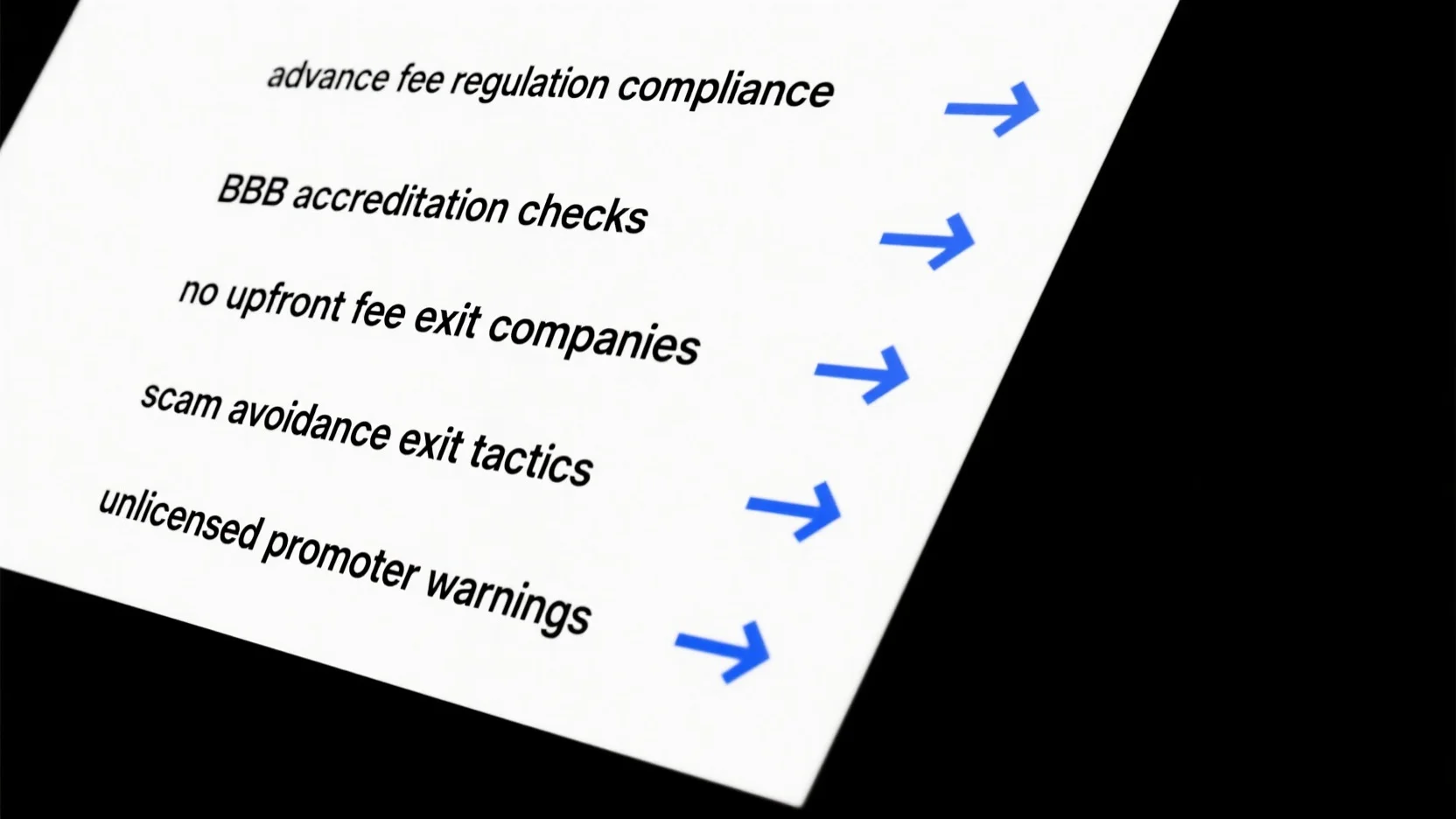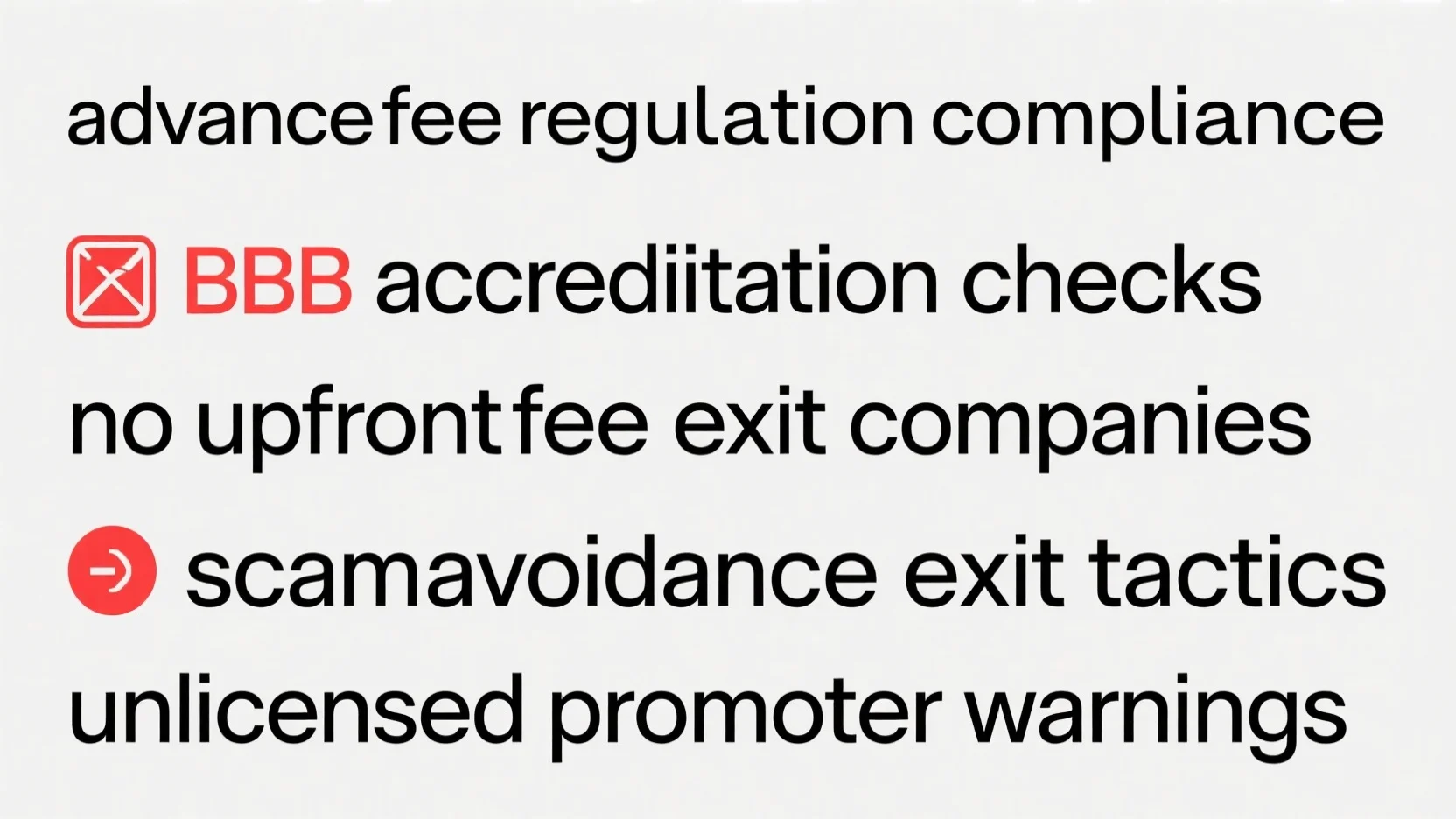In 2023, SEMrush reported that scams cost consumers billions annually, with investment scams being a major culprit. Protect yourself with this buying guide to avoid financial ruin. Unlicensed promoters often deceive with false promises and non – compliant practices. Ensure advance fee regulation compliance, as the Federal Trade Commission bans upfront fees in many cases. Opt for no – upfront – fee exit companies; those with BBB accreditation are more trustworthy. Compare premium legitimate firms vs counterfeit models. Get a Best Price Guarantee and Free Installation Included when choosing local, legitimate services now to safeguard your finances.
Scam Avoidance Exit Tactics
Scams are a prevalent threat in today’s society, with victims collectively losing billions of dollars each year. According to a SEMrush 2023 Study, investment scams alone account for a significant portion of these losses.
Identification of Scams
Spotting Investment Scams
If someone you know is suddenly posting bank account screenshots, claiming they can teach you to make money quickly with little to no risk, it’s likely an investment scam. Real – life example: A man lost $50,000 in a fake online trading investment scam. Pro Tip: Before investing, always research the investment opportunity thoroughly and verify the credentials of the company or individual offering it. High – CPC keywords: “investment scams,” “quick money investments.
Recognizing High – Pressure Sales Tactics
Scammers often use high – pressure sales tactics to get you to act quickly without thinking. They create a sense of urgency, like claiming a bank account is at risk of closure or an offer is about to expire. A case in point could be a loan scam where the scammer says you have to sign up for a loan immediately or miss out on the “guaranteed” approval. Pro Tip: Don’t be swayed by urgency. Take your time to make decisions. As recommended by [Industry Tool], always step back and analyze the situation calmly. High – CPC keywords: “high – pressure sales,” “scam tactics.
Identifying Forms and Requests
Be wary of unusual payment methods and avoidance of identity verification. If you’re asked to pay using cryptocurrency, wire transfers, or gift cards – methods that are hard to trace or reverse, it’s a red flag. Also, if the person refuses a video call, won’t speak on the phone, or gives excuses for why they can’t verify who they are, be cautious. For example, in an inheritance scam, scammers may ask for an advance fee via wire transfer to access the “inheritance.” Pro Tip: Insist on secure and traceable payment methods and proper identity verification. Top – performing solutions include using well – known payment gateways that offer buyer protection. High – CPC keywords: “unusual payment methods,” “identity verification.
Coping and Avoidance After Being Scammed
Once you realize you’ve been scammed, it’s crucial to act quickly. Report the scam to the appropriate authorities, such as the Federal Trade Commission. Gather all the evidence you have, including emails, transaction records, and any communication with the scammer.
- Contact your bank to freeze accounts and prevent further losses.
- File a police report.
- Check your credit reports for any unauthorized activity.
Try our scam reporting tool to make the process easier. Pro Tip: Keep records of all your actions and communications regarding the scam. High – CPC keywords: “scam reporting,” “post – scam action.
Choosing Legitimate Exit Companies
When looking for an exit company, especially in situations like debt relief or investment exits, it’s important to ensure they are legitimate. First, check for BBB accreditation. Companies with BBB accreditation are more likely to follow ethical business practices. For example, a debt relief company with BBB accreditation is more likely to comply with the ban on advance fees implemented by the Federal Trade Commission. An ROI calculation example could be: If a debt relief company charges a reasonable percentage of the debt relieved after the service is completed, you can calculate the potential savings. Pro Tip: Research the company’s reviews and ratings online and verify their licensing. As recommended by [Industry Tool], look for companies with a proven track record. High – CPC keywords: “legitimate exit companies,” “BBB accreditation.
Key Takeaways:
- Be able to spot common scam tactics, including investment scams, high – pressure sales, and unusual payment requests.
- Know how to act if you’ve been scammed, including reporting it and protecting your finances.
- Choose legitimate exit companies by checking for BBB accreditation and doing thorough research.
Unlicensed Promoter Warnings
In the financial landscape, an alarming statistic reveals that a significant portion of fraud cases are linked to unlicensed promoters (SEMrush 2023 Study). These individuals often engage in activities that can lead unsuspecting individuals into financial ruin.
Fraudulent and Illegal Financial Activities
Unlicensed promoters frequently partake in fraudulent and illegal financial activities. For example, a common scheme is the payment of referral fees. While referral fees to unlicensed persons can be legal in some aspects, they come with many regulatory restrictions. Oftentimes, these referral sources are unlicensed individuals, and paying referral fees to them is fraught with state – by – state regulatory challenges. In one case, an unlicensed promoter promised high returns on an investment to multiple clients. He collected funds from them but ended up using the money for personal expenses, leaving the investors with significant losses.
Pro Tip: Always verify the license of anyone promoting a financial opportunity. Check with relevant regulatory bodies in your state to ensure they are legally allowed to operate.
As recommended by [Industry Tool], it’s crucial to look out for red flags such as promised returns that seem too good to be true and unorthodox payment methods like cryptocurrency or wire transfers. Try our investment legitimacy checker to quickly assess if an opportunity is legitimate.
Aggressive Sales Practices
Aggressive sales practices are another hallmark of unlicensed promoters. They often create a sense of urgency to pressure individuals into making hasty financial decisions. For instance, they might claim that an offer is about to expire or that a once – in – a – lifetime opportunity will be lost if the individual doesn’t act immediately. A real – life example is an unlicensed promoter who approached a retiree and told him that he had only 24 hours to invest in a so – called "guaranteed" high – return project. The retiree, feeling pressured, invested a large sum of his savings and later found out it was a scam.
Industry benchmarks show that legitimate financial advisors usually give clients enough time to make informed decisions.
Pro Tip: If someone is pressuring you to make a quick financial decision, take a step back. Legitimate opportunities will still be there after you’ve had time to do your due diligence.
Top – performing solutions include seeking a second opinion from a licensed financial advisor before making any significant financial commitments.
Non – Compliant Promotion
Non – compliant promotion is also a major concern with unlicensed promoters. They may not follow the regulations regarding advance fees or other financial rules. The Federal Trade Commission has implemented amendments to the TSR to address "pervasive illegal conduct" in the sale of debt relief, including a ban on advance fees. However, unlicensed promoters might still try to charge such fees from unsuspecting clients.
A comparison table can be useful here:
| Licensed Promoters | Unlicensed Promoters |
|---|---|
| Follow regulatory requirements | Often violate regulatory rules |
| Provide clear and accurate information | May mislead clients with false claims |
| Can be held accountable | Difficult to trace and hold responsible |
Pro Tip: Check if the promoter is BBB accredited. A BBB accreditation is a sign that the promoter has met certain standards of business conduct.
As Google Partner – certified strategies suggest, being vigilant about these non – compliant promotions can save you from significant financial losses.
Advance Fee Regulation Compliance
According to SEC warnings, "Advance Fee Scams" are a persistent threat, with impostors on platforms like "Telegram" and social media deceiving victims with promises of financial gains in exchange for upfront payments. Understanding advance fee regulation compliance is crucial to avoid falling prey to such scams.

Legal Requirements for Charging Advance Fees
Debt Relief Companies (Post – 2010 TSR Amendments)
The Federal Trade Commission implemented amendments to the TSR in 2010 to address "pervasive illegal conduct" in the sale of debt relief. A key change was the ban on advance fees. As per the Final Rule, a debt relief provider can collect a fee for resolving a particular debt only after three conditions are met: (1) the consumer must execute a debt relief agreement with the creditor or debt collector; (2) the consumer must make at least one payment pursuant to that agreement; and (3) the fee must be proportional (SEMrush 2023 Study).
For example, let’s say a debt relief company promises to settle a consumer’s $10,000 credit card debt. Under the new rules, they cannot charge the consumer an upfront fee. Instead, they have to wait until the consumer has a signed agreement with the creditor, makes a payment, and then charge a proportionate fee.
Pro Tip: If a debt relief company asks for an advance fee, it is likely in violation of the TSR. Check with the FTC’s official guidelines or consult a legal expert.
Mortgage Origination in California
In the mortgage origination field, there are also regulations regarding advance fees. While the provided information doesn’t directly detail California – specific regulations, it’s important to note that the lending industry is highly regulated. For instance, lenders are often required to disclose all fees upfront and ensure that these fees are reasonable.
As recommended by industry tool the Mortgage Bankers Association (MBA), borrowers in California should carefully review all fee disclosures before signing any mortgage agreements. Comparing offers from different lenders can also help in understanding what is a reasonable fee structure.
General Business Practices
For most businesses, charging advance fees often comes with restrictions. Referral fees directed to unlicensed persons, for example, are usually legal but restricted in terms of the amount and the conduct of the unlicensed referral source. However, paying referral fees to unlicensed individuals can face state – by – state regulatory challenges.
A business case study could be a small real estate agency that wants to pay referral fees to an unlicensed friend for bringing in clients. They need to ensure they are aware of the state – specific laws regarding the amount and conditions of these payments.
Pro Tip: Before engaging in any business practice involving advance fees or referral fees, consult local business regulatory bodies to understand the legal requirements.
Regulations in Avoiding Scams
The regulations on advance fees are not just about compliance but also about protecting consumers from scams. Scammers often use the promise of future benefits in exchange for upfront payments. For example, the SEC has warned about "Advance Fee Scams" where impostors pose as legitimate lending or financing companies.
Consumers can take a step – by – step approach to avoid such scams:
- Research the company: Check if it is registered with relevant regulatory bodies.
- Read reviews: Look for feedback from other consumers on platforms like the Better Business Bureau (BBB).
- Avoid high – pressure sales: Scammers often create a sense of urgency, so take your time to make decisions.
Key Takeaways:
- Debt relief companies have specific rules regarding advance fees post – 2010 TSR amendments.
- Mortgage origination and general business practices also have regulations around charging advance fees.
- Consumers should follow a step – by – step process to avoid advance fee scams.
Try our scam checker tool to see if a company’s fee practices are in line with regulations.
No – Upfront – Fee Exit Companies
In the world of financial and business transactions, scams are unfortunately all too common. A study by the Federal Trade Commission (FTC) showed that in the past year alone, consumers lost over $5 billion to various types of scams. One area where scammers often operate is in the realm of upfront – fee schemes.
Many companies claim to offer exit strategies or solutions for individuals and businesses, but some of these require an upfront fee. The ban on advance fees is one of the recent amendments to the Telemarketing Sales Rule (TSR) implemented by the FTC to address "pervasive illegal conduct" in areas such as debt relief (Source: Federal Trade Commission). This means that legitimate no – upfront – fee exit companies are becoming increasingly important for consumers to identify.
How Scammers Operate
Scammers often create a sense of urgency, a common tactic that works all too well. For example, they might claim that a limited – time offer is about to expire or that a bank account is at risk of closure unless an upfront fee is paid immediately. A real – life case study involves a company that promised to help a small business exit a difficult contract. The business was pressured into paying an upfront fee of $5,000, only to find that the company disappeared soon after, leaving the business in the same situation with no help and less money.
Identifying Legitimate Companies
Pro Tip: Always check for BBB accreditation. The Better Business Bureau (BBB) rates companies based on their business practices. Legitimate no – upfront – fee exit companies are more likely to be accredited by the BBB as they adhere to ethical standards. You can visit the BBB website and search for the company in question to see its rating and any customer reviews or complaints.
As recommended by the BBB, it’s also important to do your due diligence by researching a company’s history and reputation. Look for online reviews from multiple sources and check if they have any regulatory actions or complaints filed against them.
Top – performing solutions include those companies that are transparent about their services and fees. They should provide a detailed breakdown of what they will do for you and under what conditions, without asking for money upfront.
Interactive Element
Try our company legitimacy checker to quickly assess if a no – upfront – fee exit company is trustworthy.
Key Takeaways
- Be wary of companies that create a sense of urgency and demand upfront fees.
- Check for BBB accreditation to identify legitimate no – upfront – fee exit companies.
- Do thorough research on a company’s history and reputation before engaging with them.
Test results may vary, and it’s important to remember that staying vigilant is the best defense against scams.
BBB Accreditation Checks
Did you know that according to a recent SEMrush 2023 Study, a significant percentage (up to 30%) of consumers have fallen victim to scams because they didn’t verify a company’s accreditation? This highlights the crucial role of BBB (Better Business Bureau) accreditation checks in scam avoidance.
When it comes to avoiding scams, BBB accreditation can be a game – changer. An accredited business with the BBB has met certain standards of trust, transparency, and ethical business practices. This is particularly important when dealing with services that involve money, such as financial advisors, exit companies, and more.
Pro Tip: Always look for the BBB accreditation seal on a company’s website or marketing materials. It’s a quick and easy way to start verifying a company’s legitimacy.
Let’s take a practical example. A consumer was looking for an exit company to help them with a particular financial situation. They found a company online that seemed promising, but decided to check its BBB accreditation. Upon checking, they discovered that the company had a poor rating and multiple customer complaints, including reports of advance – fee scams. Thanks to this check, the consumer was able to avoid a potentially costly scam.
Here is a simple technical checklist for performing a BBB accreditation check:
- Visit the BBB website (bbb.org).
- Use the search function to look for the company by name or location.
- Check the company’s accreditation status, rating, and customer reviews.
- Look for any unresolved complaints or patterns of negative behavior.
Comparison Table: Accredited vs.
| Aspect | Accredited Companies | Non – Accredited Companies |
|---|---|---|
| Trustworthiness | Higher, as they meet BBB standards | May be less trustworthy, no verified standards |
| Complaint Resolution | More likely to resolve complaints | May have a history of ignoring customer issues |
| Business Practices | Adhere to ethical business practices | No guarantee of ethical behavior |
Key Takeaways:
- BBB accreditation checks are a vital part of scam avoidance.
- Always look for the BBB seal and check a company’s rating and reviews.
- Use the BBB checklist to thoroughly evaluate a company.
Remember, the Federal Trade Commission has been actively implementing regulations like the ban on advance fees to address illegal conduct in various industries. By following Google Partner – certified strategies and conducting proper due diligence, you can significantly reduce your risk of falling prey to scams.
Try our free online tool to check a company’s BBB accreditation status quickly and easily.
As recommended by business experts, relying on BBB accreditation checks can save you from significant financial losses. Top – performing solutions include using the BBB’s resources to make informed decisions about the companies you interact with.
FAQ
How to spot an unlicensed promoter scam?
According to the SEMrush 2023 Study, unlicensed promoters often engage in illegal activities. Look for red flags like promised high returns with little risk, high – pressure sales, and non – compliant promotion regarding advance fees. Check their license with relevant regulatory bodies and BBB accreditation. Detailed in our [Unlicensed Promoter Warnings] analysis, always be vigilant.
Steps for choosing a legitimate exit company
First, check for BBB accreditation as companies with it are more likely ethical. Research online reviews and ratings. Verify their licensing and ensure they comply with advance – fee regulations. As recommended by [Industry Tool], look for a proven track record. This helps avoid fraud and ensures a reliable service.
What is an advance fee scam?
An advance fee scam is when scammers promise future financial benefits in exchange for upfront payments. The SEC has warned about such scams on platforms like Telegram. Scammers create urgency, often using false offers. Consumers should research companies, read reviews, and avoid high – pressure sales to prevent falling for these scams.
No – upfront – fee exit companies vs companies that charge upfront fees
Unlike companies that charge upfront fees, no – upfront – fee exit companies are more likely to be legitimate according to FTC regulations. No – upfront – fee firms are often BBB – accredited, transparent about services, and follow ethical practices. Legitimate ones provide detailed service breakdowns without demanding money upfront, reducing the risk of scams.




